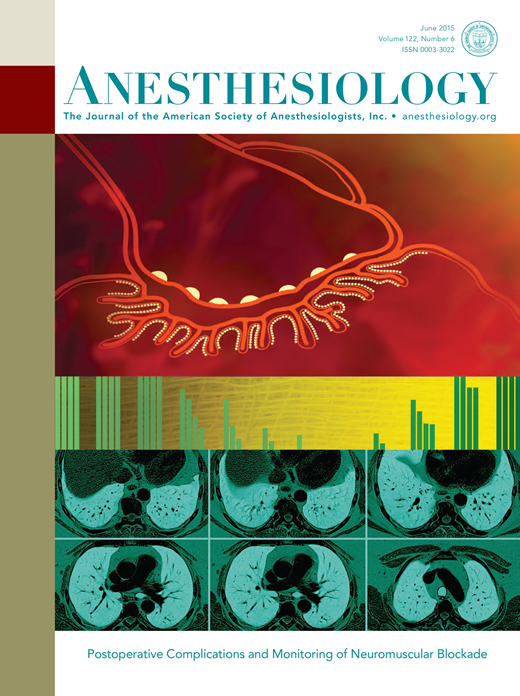Synergistic effects of commonly used ICU drugs and high temperature on skeletal muscle at the cellular and tissue levels.
IF 9.1
1区 医学
Q1 ANESTHESIOLOGY
引用次数: 0
Abstract
BACKGROUND Several drugs are commonly administered to patients with high body temperature in intensive care units (ICUs). However, previous in vitro studies have investigated only the independent effects of high temperatures or drugs on various cultured cells. We explored the hypothesis that pharmacological treatment with representative ICU drugs induces lethal effects on cultured skeletal muscle and engineered muscle tissue at high temperatures. METHODS Human skeletal muscle cultures were treated with the representative drugs propofol, dexmedetomidine, and acetaminophen at 37, 39, and 41 °C for various exposure times. To investigate the effects of the drug treatments, cell viability, lactate dehydrogenase (LDH) activity, caspase activity, and endoplasmic reticulum (ER) stress were analyzed. Conformational changes in myotubes and functional changes in contractile muscle tissue were also assessed. All experiments were repeated at least 3 times. RESULTS Dexmedetomidine and acetaminophen had no observable adverse effects at high temperatures, whereas propofol treatment at > 200 µM resulted in increased LDH activity and myotube detachment. Furthermore, this cellular injury was associated with intracellular calcium overload and upregulation of the ER stress-related genes CHOP, GRP78/Bip, and GRP94. Propofol treatment also decreased the contractile ability of muscle tissues at 39 °C (vs. 37 °C propofol, 95% CI, 30.72 to 114.87%; P < 0.001). Additionally, although tauroursodeoxycholic acid (TUDCA), an ER stress inhibitor, alleviated the increase in caspase 3/7 activity at 39 °C (95% CI, 38.10 to 145.22%; P < 0.001) and mitigated myotube detachment, it did not result in notable functional improvement in muscle contraction. CONCLUSIONS These results demonstrate that propofol had harmful effects on skeletal muscle cells and tissues at high temperatures in vitro. As these synergistic effects were closely associated with ER stress, TUDCA could mitigate propofol-induced apoptosis at high temperatures. These findings could help improve drug treatment for patients, including their functional prognosis in the clinical setting.ICU常用药物与高温对骨骼肌细胞和组织水平的协同作用。
背景:重症监护病房(icu)的高体温患者通常使用几种药物。然而,以前的体外研究只研究了高温或药物对各种培养细胞的独立影响。我们探讨了ICU代表性药物在高温下对培养骨骼肌和工程肌肉组织产生致死性作用的假设。方法用代表药物异丙酚、右美托咪定和对乙酰氨基酚在37、39和41°C下不同暴露时间处理人体骨骼肌培养物。为了研究药物处理对细胞活力、乳酸脱氢酶(LDH)活性、半胱天冬酶(caspase)活性和内质网(ER)应激的影响。肌管的构象变化和收缩性肌肉组织的功能变化也被评估。所有实验至少重复3次。结果右美托咪定和对乙酰氨基酚在高温下无明显不良反应,而异丙酚在> ~ 200µM下处理可导致LDH活性升高和肌管脱离。此外,这种细胞损伤与细胞内钙超载和内质网应激相关基因CHOP、GRP78/Bip和GRP94的上调有关。异丙酚处理也降低了肌肉组织在39°C时的收缩能力(与37°C异丙酚相比,95% CI, 30.72至114.87%;P < 0.001)。此外,尽管内质网应激抑制剂牛磺酸去氧胆酸(TUDCA)在39°C时减轻了caspase 3/7活性的增加(95% CI, 38.10 ~ 145.22%;P < 0.001)和减轻肌管脱离,但没有显著改善肌肉收缩功能。结论异丙酚在体外高温条件下对骨骼肌细胞和组织有不良影响。由于这些协同效应与内质网应激密切相关,因此TUDCA可以减轻高温异丙酚诱导的细胞凋亡。这些发现可以帮助改善患者的药物治疗,包括他们在临床环境中的功能预后。
本文章由计算机程序翻译,如有差异,请以英文原文为准。
求助全文
约1分钟内获得全文
求助全文
来源期刊

Anesthesiology
医学-麻醉学
CiteScore
10.40
自引率
5.70%
发文量
542
审稿时长
3-6 weeks
期刊介绍:
With its establishment in 1940, Anesthesiology has emerged as a prominent leader in the field of anesthesiology, encompassing perioperative, critical care, and pain medicine. As the esteemed journal of the American Society of Anesthesiologists, Anesthesiology operates independently with full editorial freedom. Its distinguished Editorial Board, comprising renowned professionals from across the globe, drives the advancement of the specialty by presenting innovative research through immediate open access to select articles and granting free access to all published articles after a six-month period. Furthermore, Anesthesiology actively promotes groundbreaking studies through an influential press release program. The journal's unwavering commitment lies in the dissemination of exemplary work that enhances clinical practice and revolutionizes the practice of medicine within our discipline.
 求助内容:
求助内容: 应助结果提醒方式:
应助结果提醒方式:


